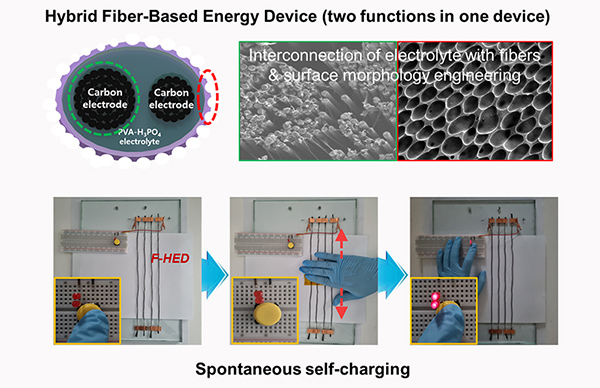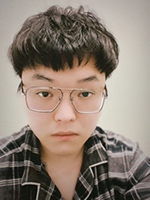
News & Events

News & Events
The University of Michigan – Shanghai Jiao Tong University Joint Institute (UM–SJTU JI, JI hereafter) Assistant Professor Yuljae Cho and his collaborators have published a research article titled “Enhanced Spontaneous Self-Charging through Scalable Template-Free Surface Engineering at Building Block Fiber Scale for Wearable Electronics” in Nano Energy, a top journal in the materials science discipline with an impactor factor of 19.069. The paper with Yuljae Cho as its corresponding author is co-first authored by Fengyi Shen, a JI undergraduate student, and Sijia Miao, a graduate student of the Energy Conversion and Optoelectronics Laboratory under the supervision of Dr. Cho.
The published article based on a research project sponsored by National Natural Science Foundation of China (NSFC) presents a unique device structure which enables the spontaneous self-charging mechanism for wearable devices. Despite that the concept of the self-charging has been introduced, most of the self-charging was achieved in the form of two-functions-in-two-devices. In the research work of Dr. Cho, the devices exhibit the self-charging mechanism in the form of two-functions-in-one-device. In addition, a template-free scalable method was introduced to build wearable devices with high controllability of key device parameters. This led to the improved electrochemical behaviors as well as energy harvesting performance, achieving the enhanced spontaneous self-charging at the building block fiber scales (Figure below).

Wearable electronics, such as smart watches and smart glasses, have been commercialized in recent years and they provide great convenience for our daily lives with advanced functions. Attributed to recent development in long-life batteries, these devices can be frequently re-charged through an external power supply with long life expectancy. The dependence on the external energy source, however, has limited implementation of the wearable electronics for advanced applications where standalone wearables are highly required, such as wearable bio-medical devices.
In spite of its importance, a self-charging capability in wearable devices is at its early stage of development for the time being. It has been a challenging issue to directly add advanced functions to wearable devices built on bulk textile platform due to lack of controllability in the bulk form. In contrast, for wearables, a bottom-up approach from the building block fiber allows to engineer and functionalize each component with high controllability. Therefore, fabricating wearable devices from their building blocks provides a viable solution to introduce advanced functionality. The new method developed in the paper is expected to offer a promising route to tackle the current bottlenecks faced by the wearable electronics and propel the self-powered wearable electronics forward in the future.
Weblink of the published article
https://www.sciencedirect.com/science/article/pii/S2211285522009685

Fengyi Shen is an undergraduate student of the UM-SJTU Joint Institute, who is expected to graduate in 2023 and pursue graduate study at Stockholm-based KTH Royal Institute of Technology. His research mainly covers triboelectric nanogenerator and programable matters.

Sijia Miao is a graduate student of the UM-SJTU Joint Institute. She received her Bachelor of Engineering degree from Huazhong University of Science and Technology in 2021. Her research mainly covers perovskite solar cells and wearable electronics.

Dr. Yuljae Cho joined the UM-SJTU Joint Institute as an assistant professor in 2020. He received his Ph.D. degree at University of Oxford and was a research associate at University of Cambridge. His research focuses on energy harvesting for self-powered electronics and optoelectronics based on emerging nanomaterials for energy saving technology.

SCHOOL OF PHARMACY,SJTU
Address: 800 Dongchuan Road, Shanghai
200240